No products in the cart.
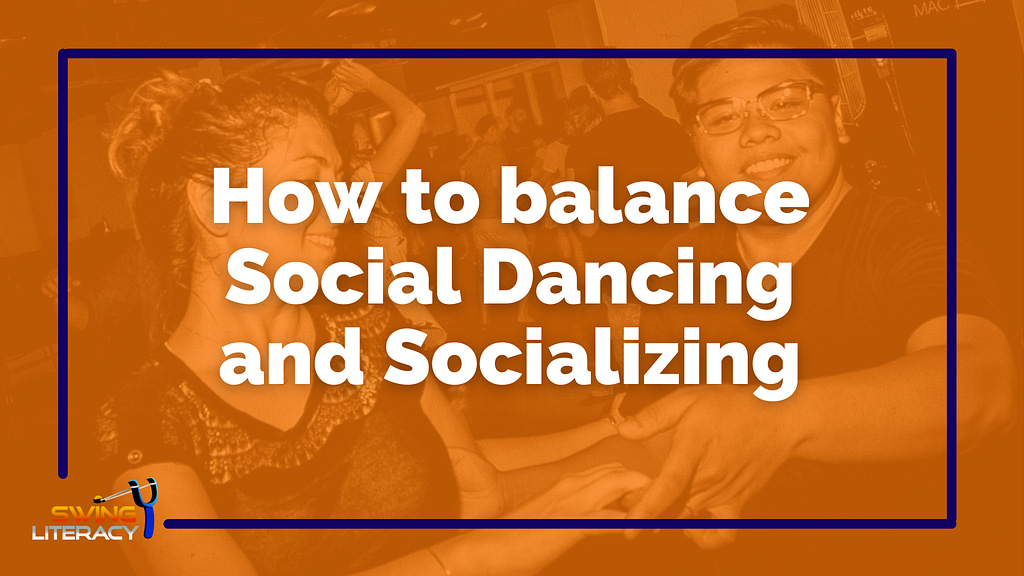
How to balance Social Dancing and Socializing
Reading Time: minutes remaining
Post-pandemic, as you have been reassessing your priorities in dance, you may have noticed you have had a bit of an imbalance. Focusing too much on training and not having enough fun, or the reverse – focusing so much on the party aspect of our dance that your skills are suffering...
Regardless of your reasons and goals for dancing, it’s important to try to find balance between your social dancing and your socializing. Here's a guide to help you self-assess and take action to rebalance so you can feel more complete and enjoy your dance more!
Remember your "why"
The vast majority of dancers started social dancing because they were looking for a social life. Sure, there is a percentage of the West Coast Swing population that were (like Myles) already dancers in the habit of training who simply turned their attention to West Coast Swing. But most people will tell you that they “discovered” WCS when they were searching for something that filled a need: social interaction.
- The college kid looking for a social outlet that’s not a pub crawl
- The divorcee emerging from his shell to create a new social circle
- The isolated professional realizing she needs more balance in her life
- The retired couple looking for activities to stay active and inspired
- The awkward computer engineer needing to engage with real humans
Me? I was a recent graduate looking for a social hobby I could do selfishly to balance out my service career as a competitive swimming coach.
Take a moment and reflect: have your reasons for dancing evolved since you started?
The original purpose for the dance
West Coast Swing is, at its core, a social dance first and a performance dance second. But these are not mutually exclusive. At the grassroots level, the purpose of dance lessons is to learn a skill that is fun to do with friends. It gives you something to do at parties, an access point for conversations, and a physical way of engaging with music together. Sure there’s a whole training side to it, but even training is designed to be social, like playing tennis, street basketball, or bowling.
But now the dance has expanded and many more training and performance opportunities are available. It’s easy to get caught up and forget about the social side of the dance – you know, the reason you likely started in the first place. You know, the reason this American cultural dance exists in the first place. #knowyourroots #swingliteracy
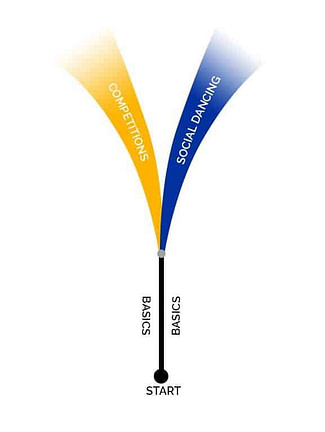
What WCS is NOT
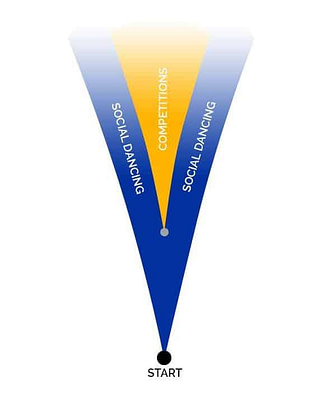
What WCS IS
Everyone has the right to choose what WCS means to them and what they want to get out of it.
But make no mistake: West Coast Swing does not force you choose a path of EITHER competition OR social dancing. It is a SOCIAL dance that you may CHOOSE to compete in.
This means everyone learns to social dance first, and competition is just an added, optional extra which you can choose at any time. There is immense value in social dancing for its own sake – competition is not necessary in order to be socially, emotionally, and creatively fulfilled in West Coast Swing.
There is also immense value is simply socializing off the dance floor. Our dancing hobby provides a wonderful context for people to practice their social skills, network with likeminded people, share joyful moments, have meaningful conversations, exercise empathy, generosity, and acceptance, help each other learn new skills, and celebrate each others’ growth. I’m sure the list is longer, but let’s move on.
We all need balance
Being predominantly interested in socializing and not trying to improve your dance is fine as long as you’re not hurting your partners, but it won’t help you make more finals or feel better in your own skin. “I’m just a social dancer so I don’t need technique” is a dangerous load of BS that teachers everywhere work to combat.
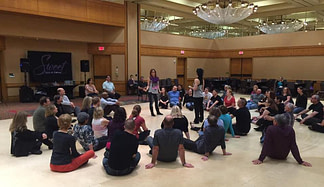
Social dancing is a skill: it requires training to be executed safely and effectively. Yes, it's valid to social dance "just to enjoy yourself", but since this is a partner activity, you owe it to your partners to learn how to dance safely so they can enjoy themselves too. Ask yourself: How do you know you are dancing safely and effectively? How long has it been since you last had a private lesson with a teacher?
Social dancing is also a language: the better you speak it, the more partners will want to speak with you. If you only bother to learn a language to the level of a Kindergartener but then stagnate, your partners have to work harder to converse with you.
It’s important that when pursuing goals in learning or in competition, that you do not neglect your own human social needs. Focusing too much on practicing, training, competition, performance, etc. can isolate you from the community and could lead to burnout.
I often see dancers show up to a dance party or event like they would show up for a workout at the gym: “gotta get those reps in in order to get those #gainz!” This would be fine, if once in a while they participated in an apres-dance meal, a hotel room party, or a bbq. Something, anything more than a 3-minute water break between songs.

As a competitor, it is to your advantage to get to know the partners you might draw in competition. If you curate a relationship with your peers, you will enjoy a supportive (as opposed to cutthroat) competitive environment, where everyone pushes each other to be better. But if you neglect your peers or don’t engage socially with them, you might be excluded from this benefit.
But socializing is hard!
Sure, for some people. And that’s ok. Remember, that’s part of what you signed up for.
So how do you find the balance between the hard work of dance wellness and the hard work of social wellness? There is a wealth of advice (especially on the Coach’s Corner blog!) about improving your social dancing. But let’s talk here about improving your socializing.
This topic deserves more attention beyond the scope of this article and my arena of expertise, but I have done my share of reading and training, so my goal here is to draw attention to areas to be aware of and investigate further.
Assess your needs
Consider the nature of your personal social challenges: Do you suffer from anxiety? Depression? ADHD? Are you an introvert? An alpha? Conflict-avoidant? Misunderstood? Quick-tempered? Do you have relationships to mend? Conflicts to resolve?
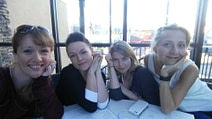
Then consider what you are wanting/lacking on the Social side of your dance life: a bestie to trust explicitly? A #tribe (group of close friends)? Bonding with same-level peers? Approval from dance partners? Local community connection? Inclusion in group activities? A romantic relationship? Peaceful drama-free dance activities?
I can’t possibly solve your problems, but instead recommend that you spend some time identifying what you really want and consider honestly what really are the obstacles to achieving it. Reach out and ask for help/advice to trusted friends inside or outside the community.
It is safe to assume that nobody knows if you are suffering unless you tell them. Nobody knows what your needs are unless you reveal them. At the same time, consider that you have no idea what other people really think of you, or of themselves, so it is unrealistic and dangerous or torturous to make any assumptions – never assume, always ask. Which brings us to…
Invitation and Initiative
It’s not enough just to show up to a social dance – you have to take responsibility for putting yourself out there. This means if you sit in a back table with a pout on your face and never approach anyone, you can’t go complaining that the party was “cliquey” and “uninviting”. It’s up to you to jump in the pool and play well with others. More on this topic next week in Part 2!
Ask questions
It’s a critical, pivotal, fundamental skill for social, business, and academic survival: ask questions! If you would like to know more about a topic, you pose the question then search for the answer. If you don’t understand something your teacher said, you owe it to yourself and to the teacher to ask, right?
Same goes for social interactions! If you wonder what a country/experience/perspective is like, ask! People love to be asked their opinion, and most people love to talk about themselves, so if you want to put yourself out there, ask people about themselves. Ask what they do outside of dance. Questions help take an acquaintance-ship to the next level – the more opportunities you can grab to increase the quality of your conversations, the better!
It’s interesting to note how many extroverted dancers don’t ask social questions. The vast majority of the time, I find myself being the one asking others questions about themselves, but they rarely reciprocate. They are neglecting one of the fundamental rules of engagement: social reciprocity. As a result, I get to know them, but they don’t get to know me.
I always appreciate it when a conversation goes both ways. (dance pun intended!) Wanna feel connected to me? Trade questions with me.
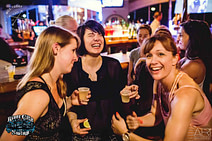
Shy people
Allow others to get to know you by being present at social activities and engaging not just observing. Sometimes being the quiet, observing one in the corner can backfire: it might make you seem creepy, or a “cling-on”. Try to engage at least one person you did not arrive with.
Don’t assume that a quiet person is a snob or awkward. Give them a chance and the benefit of the doubt – include them with eye contact, asking questions, invitations, etc. If you are at a room party, think, “Who do I know that would appreciate being here right now, that I would also like to get to know better?” Then take action and message them! Just being thought of can be enough to make them feel included this time or next time.
The Value of Elders
Youth is not an indication of intrigue. Fascinating people grow older too- I have met unassuming 50+ year olds on the dance floor who I found out later over a drink have led fascinating lives: Multiple military tours, film actors, NASA scientists, air traffic control tower engineers, NASCAR technicians, people who have motorcycled cross-country, completed the Ironman triathlon, tour as an acclaimed author, performed on Broadway, won Olympic medals, been to Burning Man, invented and patented things, recovered from abuse or addiction, etc.
I also was underestimated and discriminated against as a young person- I have been shocking older people my whole life who have assumed I was “to young” to have had the non-dance experiences and resume I have, and are surprised I can relate to them. Never dismiss someone out of your age bracket as boring.

Insert Quality Time at Events
Try to be flexible enough with your schedule that you can say yes to impromptu invitations. Make sure you set your priorities in advance so you can see where these flex-times are in your schedule. For example, book time for the workshops you want to take first. Then see if you can inject some intentional social time into your event weekend schedule, and this might take some creativity. Here are a few ideas:
- Stay for a few social dances after your contest is over
- Invite a friend for lunch or coffee in the middle of the day
- Invite a small group of people to your room for drinks or snacks after the comps are over
- Hang at the pool for hot tub with a friend for a quick recharge
- Grab some gym-going friends and workout together
- Invite a girlfriend or two to do hair and makeup together in your room
- Wrangle a group to make a Friday trip to the grocery store and lunch
Empathy
It’s a possibility that most of the problems in the dance community and world at large boils down to a lack of empathy. Why not start practicing it in our daily lives?
In Canada, we have a cool elementary school program called Roots of Empathy: it is “an evidence-based classroom program that has shown significant effect in reducing levels of aggression and bullying among school children while raising social/emotional competence and increasing empathy.” Side note: this, along with Zones of Regulation, are common best practices in most BC schools that are making a massive difference in the social/emotional skills of this generation.

Start by considering that your experience is totally unique, and needs to be shared to be understood. Others’ perspectives are valid and worth understanding, so you can share and understand each other.
Some talking points to share: What game you’re playing, what you’re working on, what inspires you, what you appreciate in a partner, what you get out of a social dance, what mood you’re in, etc. Maybe even commiserating: how long it took you to learn that footwork, music preferences, health problems, anecdotes. Just imagine how the whole community might shift if we all initiated a generous gesture to understand someone.
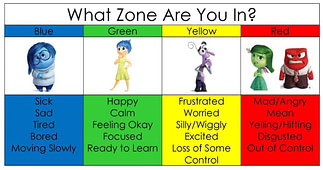
Empathy can make your social dance better: Ever notice that the best dances are right after a great conversation? There is a real correlation between having an emotional connection with someone and a dance connection with them. Not necessarily a romantic emotional connection: just a feeling of mutual understanding. This is why I only dance ProAm Strictly with students I have worked with, and some of my best Strictly Swings have happened after bonding over drinks at the bar.
Empathy during a dance
Here’s a battery of mantras to be more empathetic while dancing:
- My partner is doing the best they can.
- They are often not aware of their own bad habits, or are distracted by trying to work on them.
- Dancing is them vulnerably presenting themselves to me for approval and cooperation.
- They are likely very nervous that they will not please me.
- My partner does not owe me a technically perfect dance.
- I am responsible for managing my own enjoyment.
- I should be capable of elevating any partner, or at least learning how to.
- Use genuine words of affirmation. No correcting, ever.
- Like rowing, I am part of a team and my partner is relying on me.
- Imagine that my focus should be on entertaining my partner, not myself.
- Never use my partner for my own agenda.
- I will speak up if my partner is hurting me or making me feel uncomfortable.
- Pay attention to facial expressions so I know when I’ve crossed a line.
- Consider that my partner’s goals for showing up to the dance party are not necessarily to train.
- The goals they have for the dance we share for 3 minutes may not be the same as mine, and this is ok.
Relationships
Ooh, this topic is bigger than the scope of this article, but let’s talk about how relationships influence your social balance. It is not uncommon to engage in personal relationships with fellow dancers, in fact for some, this is one of their main goals for taking up social dancing.
If your significant other dances, it will be easy to coordinate your socializing around dancing. Just be sure to reserve quality time for your other friends too: maintain the friendships you had before you met your S.O., not only for your own emotional health, but so you have a support system if things turn south.
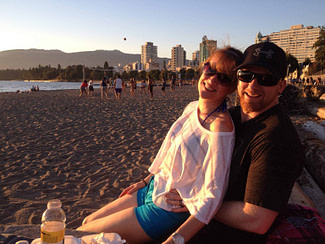
If your significant other doesn’t dance but supports your dancing, be sure to fill them in and involve them whenever possible, as you see fit. Invite them to non-dancing social events where dancers are attending, so they get to meet your circle, and your circle gets to know you better by learning about your S.O. Even better, combine a dance convention weekend with some sightseeing time in a new city together. Wherever you are, be sure to reserve quality time away from dancing.
If your significant other does not dance and does not support your dancing, you may have some decisions to make. It is widely known that dance changes people – for the better. But as you grow within the dance, your goals and reasons for dancing will change, which might put strain on an existing relationship.
Everybody’s situation is different, so I can’t propose to counsel. Sure, there are other fish in the sea, but remember West Coast Swing isn’t going anywhere. If you need to take a hiatus, we will all still be dancing when you are ready to return.
How we do it (or try)
Myles and I genuinely like meeting new people and learning more about friends. Not gonna lie – it’s pretty useful in our profession. I know some Pros who simply don’t have that type of personality – they simply love the dance and only tolerate teaching and social dancing for work. Hey, to each his own – as long as they are fulfilled in their own way and doing the job they are contracted to do. But for us, besides the pure joy of performing and genuine love of teaching, we find fulfillment in the social aspects both within and outside of our familiar social circle.
Spending quality time, making memories, sharing inside jokes are things that deepen our connection, our sense of belonging, and fill our bucket. We actually often make decisions on event contracts based on the social value included. We are known for being social and in the ballroom, and we genuinely love social dancing with all levels, but when our downtime is packed full of social dancing it still feels like we missed something.
It’s hard to find time for the balance we know we need. Here’s an outline of an average event day. Sometimes there is no Showcase division; sometimes there are more private lessons. This is just a sample.
- 10am wakeup
- 11am workshop
- 12pm private lesson
- 1pm private lesson
- 2pm lunch & change
- 3pm-5pm judge or more private lessons
- 5pm floor trials
- 6-9 pm dinner and Showcase prep
- 9pm watch Rising Star
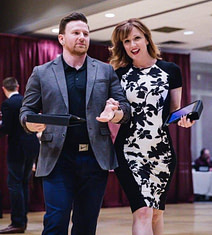
- 9:30pm Showcase
- 10pm watch Classic
- 11pm Champions J&J
- 12am buffet/staff reception/scavenge for food, hit the bar before it closes
- 1am-3am try to hit the room parties we have been invited to: birthdays, etc.
- 3am- maybe have time/energy for social dancing, unless we are assigned a 10am workshop.
At many events now, we are genuinely missing our social dancing. But as you can see, our schedule is too packed to facilitate it. In fact, I recently had a smokin’-hot, late-night, take-your-breath-away dance on a Sunday afternoon waiting for awards to start, because I was so “dance starved” that weekend.
I have nothing against room parties- I enjoy Jello Shots as much as the next person, but it’s it’s a Catch 22: too easy to lose track of time- I get involved in a great conversation, which is filling my need for social connection. Why would I excuse myself – this is part of why we’re here.
I always feel torn between groups I want to hang out with. I genuinely like my community and our students and want to hang out with them and bond, but at the same time I want to take advantage of the time with our fellow pros that I don’t get to see often because we are always flying in different directions. Even though we see each other judging, backstage, and in the private lesson room, doesn’t mean we are connecting.
Myles and I have found we need to be proactive to set aside time for peer quality time, because if we don’t, the weekend slips away from us and we have missed out on bonding opportunities.
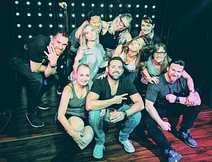
Outside of events, we stay sane by having independent hobbies at home in Vancouver: Myles likes to golf, go kickboxing, tune his car, and has a posse of non-dance guy friends to call on. I have yoga, running, rollerblading, and I love connecting one-on-one over brunch.
Fortunately, when we travel, Myles and I have the same taste in activities and sightseeing preferences so when we are not working, we both agree on how to spend down time and how much we prioritize socializing!
Further reading
Zouk blogger, Laura Riva, writes some awesome articles on the social aspects of dance that are very transferrable to WCS on her blog, The Dancing Grapevine. Here’s one that caught my eye on this topic: In a Culture of Isolation, Be the Invitation
Other related Coach’s Corner articles:
Your Westie Diet
What Do You Want?
Anchoring for the Westie Soul
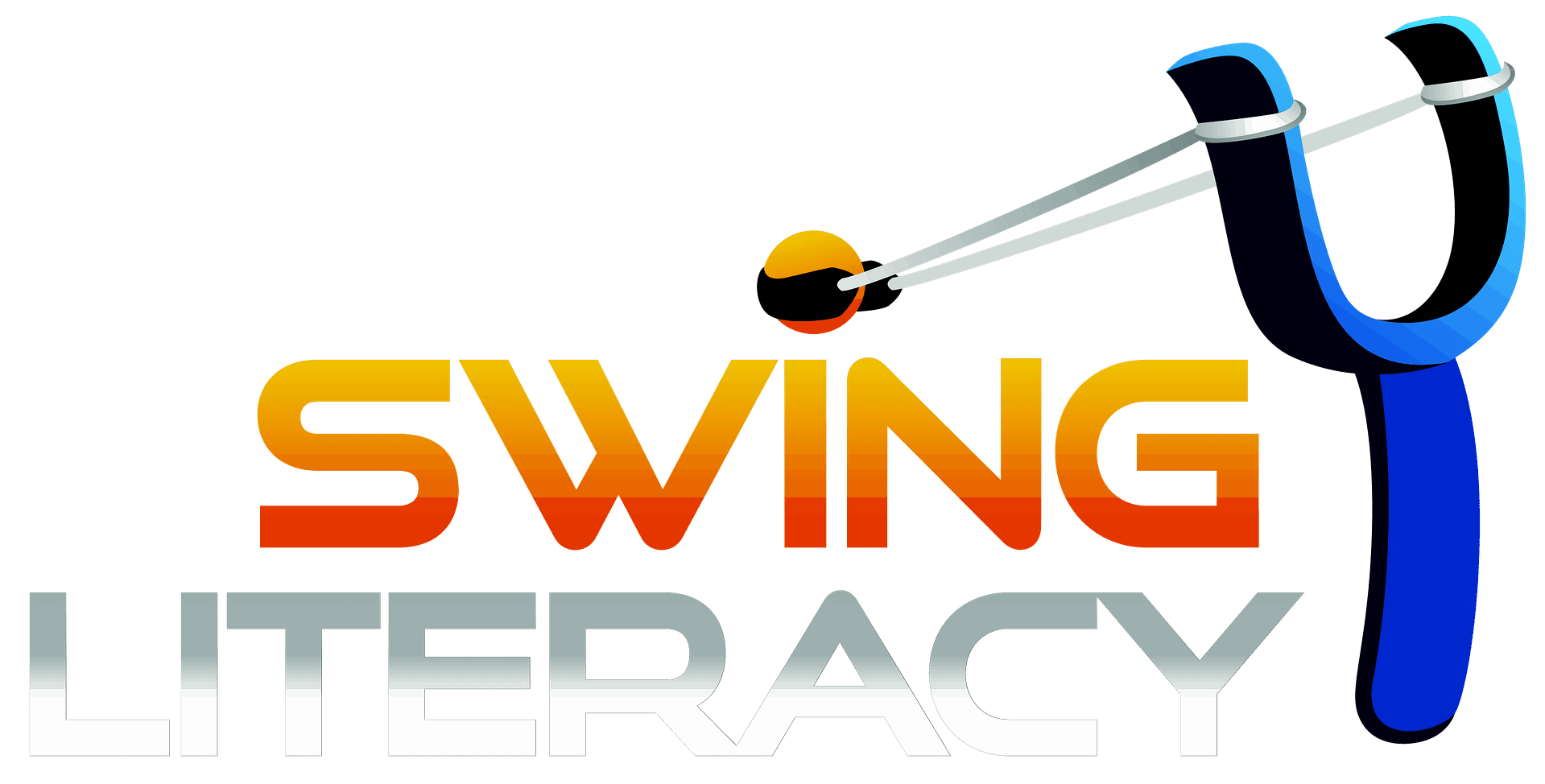
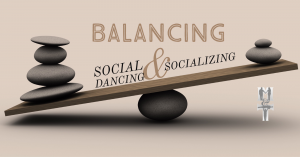 How do you manage your social wellness with your dance wellness? It’s easy these days to get wrapped up too much in your own training and/or competitive capital – have you paused to take inventory lately of your social/emotional capital? What about the reverse – have you been focusing so much on the party aspect of our dance that your skills are suffering? Regardless of your reasons and goals for dancing, it’s important to try to find balance between your social dancing and your socializing.
How do you manage your social wellness with your dance wellness? It’s easy these days to get wrapped up too much in your own training and/or competitive capital – have you paused to take inventory lately of your social/emotional capital? What about the reverse – have you been focusing so much on the party aspect of our dance that your skills are suffering? Regardless of your reasons and goals for dancing, it’s important to try to find balance between your social dancing and your socializing.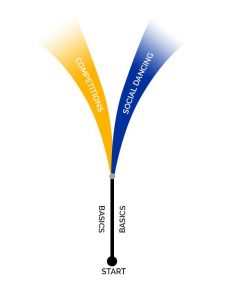
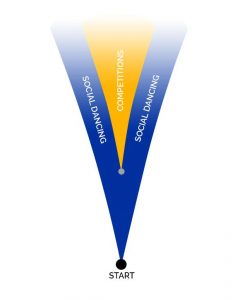
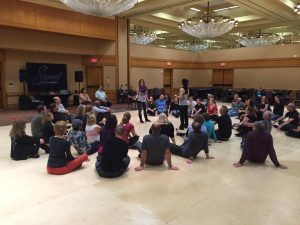 Being predominantly interested in socializing and not trying to improve your dance is fine as long as you’re not hurting your partners, but it won’t help you make more finals or feel better in your own skin. “I’m just a social dancer so I don’t need technique” is a dangerous load of BS that teachers everywhere work to combat.
Being predominantly interested in socializing and not trying to improve your dance is fine as long as you’re not hurting your partners, but it won’t help you make more finals or feel better in your own skin. “I’m just a social dancer so I don’t need technique” is a dangerous load of BS that teachers everywhere work to combat.
 Consider the nature of your personal social challenges: Do you suffer from anxiety? Depression? ADD? Are you an introvert? A dominant alpha? Misunderstood? Quick-tempered? Do you have relationships to mend? Conflicts to resolve?
Consider the nature of your personal social challenges: Do you suffer from anxiety? Depression? ADD? Are you an introvert? A dominant alpha? Misunderstood? Quick-tempered? Do you have relationships to mend? Conflicts to resolve?
 The Value of Elders
The Value of Elders
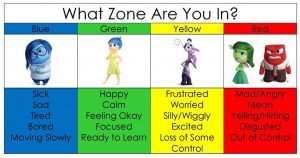 Some talking points to share: What game you’re playing, what you’re working on, what inspires you, what you appreciate in a partner, what you get out of a social dance, what mood you’re in, etc. Maybe even commiserating: how long it took you to learn that footwork, music preferences, health problems, anecdotes. Just imagine how the whole community might shift if we all initiated a generous gesture to understand someone.
Some talking points to share: What game you’re playing, what you’re working on, what inspires you, what you appreciate in a partner, what you get out of a social dance, what mood you’re in, etc. Maybe even commiserating: how long it took you to learn that footwork, music preferences, health problems, anecdotes. Just imagine how the whole community might shift if we all initiated a generous gesture to understand someone. Ooh, this topic is bigger than the scope of this article, but let’s talk about how relationships influence your social balance. It is not uncommon to engage in personal relationships with fellow dancers, in fact for some, this is one of their main goals for taking up social dancing.
Ooh, this topic is bigger than the scope of this article, but let’s talk about how relationships influence your social balance. It is not uncommon to engage in personal relationships with fellow dancers, in fact for some, this is one of their main goals for taking up social dancing.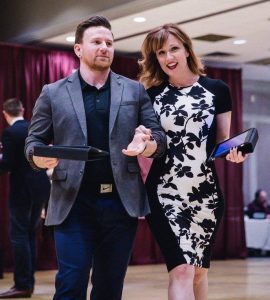 It’s hard to find time for the balance we know we need. Here’s an outline of an average event day. Sometimes there is no Showcase; sometimes there are more private lessons. This is just a sample.
It’s hard to find time for the balance we know we need. Here’s an outline of an average event day. Sometimes there is no Showcase; sometimes there are more private lessons. This is just a sample. I always feel torn between groups I want to hang out with. I genuinely like my community and our students and want to hang out with them and bond, but at the same time I want to take advantage of the time with our fellow pros that I don’t get to see often because we are always flying in different directions. Even though we see each other judging, backstage, and in the private lesson room, doesn’t mean we are connecting. Myles and I have found we need to be proactive to set aside time for peer quality time, because if we don’t, the weekend slips away from us and we have missed out on bonding opportunities.
I always feel torn between groups I want to hang out with. I genuinely like my community and our students and want to hang out with them and bond, but at the same time I want to take advantage of the time with our fellow pros that I don’t get to see often because we are always flying in different directions. Even though we see each other judging, backstage, and in the private lesson room, doesn’t mean we are connecting. Myles and I have found we need to be proactive to set aside time for peer quality time, because if we don’t, the weekend slips away from us and we have missed out on bonding opportunities.
Thank you! I find your articles insightful and on point.
Wow that’s a lot of information!
Wonderfully thoughtful and sharing blog…well done!
How I love Tessa almost read my mind this concern and send the article at the right moment. 🙂
Yes, since I don't have a dance partner, I need to meet my dancing needs to be met. So it's tough to balance dance and social. Also, I'm usually feeling disconnected from this world since I moved to the US cuz English is my 2nd language and I really don't understand what people are saying a lot of the time. Feeling of isolation is tough especially there are so many people around you and not being able to respond what they are saying makes me feel bad and I feel some people avoids me. That's partly the reason why I limited the length of time of social with people. But this article reminded me the importance again. I know it takes time but I'll try my part at least. If anyone feel like me, you are not alone.